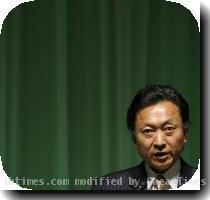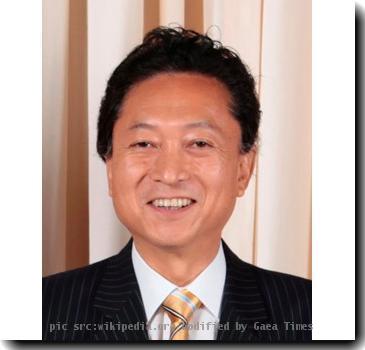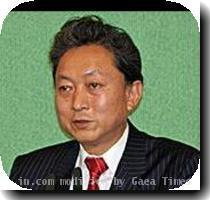Japan’s ruling party seaches for new leader with finance minister seen as likely next PM
By Malcolm Foster, APWednesday, June 2, 2010
Finance chief Kan seen as Japan’s likely next PM
TOKYO — Finance Minister Naoto Kan, a straight-talker known for standing up to Japan’s powerful bureaucrats, won the support of key potential rivals in the ruling party and emerged the only major candidate Thursday to become the country’s next prime minister.
Kan, 63, who is also deputy prime minister, will run in Friday’s ruling party election to choose a new leader to replace Yukio Hatoyama, who resigned Wednesday after just eight months in office amid public disgust with broken campaign promises.
Because the ruling Democratic Party of Japan controls a majority in the more powerful lower house of parliament, the new party chief will almost certainly become prime minister.
The next leader will face the tough job of trying to revive voter confidence in the party ahead of upper house elections expected in July. The vote is seen as a referendum on the Democrats after they trounced long-ruling conservatives in lower house elections last August.
Kan is considered a good choice for rallying support for the party because of his reputation as a principled politician and because he is not a political blue blood like Hatoyama and other past prime ministers. Kan gained popularity in 1996 as health minister when he exposed a government cover-up of HIV-tainted blood products that caused thousands of hemophilia patients to contract the virus that causes AIDS.
“He’s outspoken, he doesn’t mind stepping on toes, he’s a person who has got a bit of a populist side to him,” said Jeff Kingston, director of Asian studies at Temple University in Tokyo. “I think Kan will probably lead the party to a somewhat better, somewhat surprising result in those elections. I don’t think they’ll be quite as catastrophic as some pundits are predicting.”
Foreign Minister Katsuya Okada had been considered a contender for the party leadership, but said Thursday he was not running and would back Kan instead. Transport Minister Seiji Maehara, another possible candidate, also said he would support Kan.
At a news conference where he officially declared his candidacy, Kan stressed his ordinary upbringings.
“I grew up in a typical Japanese salaryman’s family. I’ve had no special connections. If I can take on a major role starting from such an ordinary background, that would be a very positive thing for Japanese politics.”
If chosen as prime minister, Kan said he would “push forward the economic, social and fiscal reforms that the people have high expectations for us to tackle.”
And while he called ties with the U.S. the “cornerstone” of Japanese diplomacy, “we will also place importance on Japan’s ties with China. That’s the right choice for Japan’s future.”
The only other candidate for the top job is little-known Shinji Tarudoko, chairman of the party’s environmental committee, who has the backing of some younger party members.
Kan is known for speaking his mind, and has been critical of the Bank of Japan for not doing enough to fight deflation. Immediately after he was named finance minister in January, Kan jolted the currency market by calling for a weaker yen to ease pressure on the country’s vital exporters.
Nicknamed “Irritable Kan” in the past for his temper, he has also sought to increase fiscal responsibility in a country with a ballooning budget deficit — a serious problem for the world’s second-biggest economy as its population ages and declines.
The Democrats roared into power amid high hopes last August when it crushed the Liberal Democratic Party that had ruled Japan for most of the post-World War II era. Voters were inspired by the party’s vision to bring more accountability to politics-as-usual and rein in powerful bureaucrats.
For a while the public seemed satisfied with the Hatoyama government’s attempts to cut back huge public works projects.
But in recent months Hatoyama’s approval ratings tumbled amid political funding scandals and, most critically, his backtracking on a campaign pledge to move a key U.S. Marine base off the southern island of Okinawa. He also reneged on other promises such as cash handouts to families with children, halving the money from the initial proposal, and toll-free highways, which have been postponed.
The Liberal Democrats remain in disarray after their defeat last year, but recent polls show some voters may be swinging back toward them.
Even a disastrous performance in the upper house elections, where half the seats are up for grabs, would not threaten the Democrats’ grip on power because they command a large lower-house majority. But heavy losses would likely force the party to woo new coalition partners to ensure smoother passage of bills.
Currently, the tiny Peoples’ New Party is the DPJ’s only coalition partner after the Social Democrats ditched the government last weekend. Their leader, Mizuho Fukushima, rejected Hatoyama’s decision to keep U.S. Marine Air Station Futenma on Okinawa, a move that has angered island residents and will continue to be a festering problem.
Associated Press writers Mari Yamaguchi, Tomoko A. Hosaka and Jay Alabaster contributed to this report.
Tags: Asia, East Asia, Japan, North America, Political Issues, Political Resignations, Political Scandals, Tokyo, United States, Yukio Hatoyama


